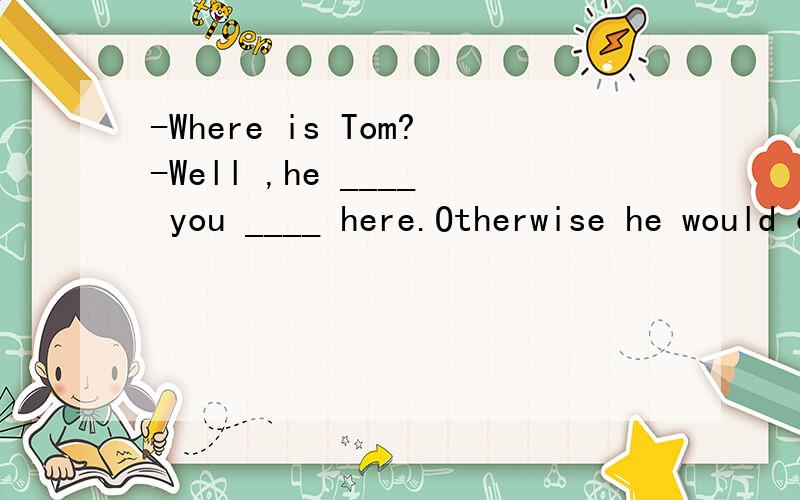-Where is Tom?-Well ,he ____ you ____ here.Otherwise he would come downA didn't know;wereB hasn't known;areC doesn't know;areD will be waiting我想问大家为什么不选B呢
来源:学生作业帮助网 编辑:作业帮 时间:2024/04/29 00:18:59

-Where is Tom?-Well ,he ____ you ____ here.Otherwise he would come downA didn't know;wereB hasn't known;areC doesn't know;areD will be waiting我想问大家为什么不选B呢
-Where is Tom?-Well ,he ____ you ____ here.Otherwise he would come down
A didn't know;were
B hasn't known;are
C doesn't know;are
D will be waiting
我想问大家为什么不选B呢
-Where is Tom?-Well ,he ____ you ____ here.Otherwise he would come downA didn't know;wereB hasn't known;areC doesn't know;areD will be waiting我想问大家为什么不选B呢
望采纳
C
因为他不知道是指知道现在他仍然不知道,虽然完成时态有可以表示继续的意思,但是句子翻译过来还是有所区别的.
给你扩充一下现在完成时态与过去时态的区别
1. 意义上的区别
一般过去时态只是单纯地表示过去某一时间发生过的动作或者存在的状态, 和现在没有任何联系, 只着眼于过去.
现在完成时态重点强调与现在的联系, 表示过去发生的动作对现在造成的影响和结果, 属于现在时的范畴.
试比较下列例句:
I have washed my shoes . 我刷过鞋了.
强调的是过去的某一时间发生的动作"洗" 对现在产生的影响是" 鞋是干净的" .
I washed my shoes yesterday . 我昨天刷了鞋.
强调昨天做过"洗" 这个动作, 与现在鞋是否干净没有关系.
My father has bought a new car . 我爸爸买了一辆新车.
强调在过去的某一时间发生的动作"买" , 对现在造成的结果是" 他有了一辆新车".
My father bought a new car last Sunday . 我爸爸上个周日买了一辆新车.
强调上个周日"买" 这个动作发生过, 与爸爸现在是否有车无关. 也许这辆车是给别人的.
2. 时间状语的区别
一般过去时态只能与表示过去的时间状语连用, 如 yesterday, last week, three years ago, in 1990 , just now 等.
现在完成时态中的时间状语表达的时间是到现在为止. 如: just 刚刚, before 以前, "since / ever since +过去时间 " 自从. 开始, ever 曾经, never 从未, 未曾, "already" 已经 , " for+ 时间段"已有多长时间了. in the last/ past ten years 在过去的十年里, so far 到目前为止. up to now 直到现在, this week 这个星期等等.
一般过去时的用法如下:
例A:He worked very hard last year.
(去年他很用功.)
例B:Mr. Smith bought a new car yesterday.
(史密斯先生昨天买了一辆新车.)
例C:They were here only a few minutes ago.
(几分钟前他们还在这里.)
解说 一般过去时最明显的现象就是常由表达过去之时间的副词或副词短语来修饰它(如各例句的斜体字部分).这些常用于修饰一般过去时的副词有:yesterday, yesterday morning (afternoon, evening ), just now (刚才), before (以前) , then (at that time ) (当时) , last +时间 (如 last week, month, year, Monday, … January, … spring, …, etc. ), that +时间 (如 that day, afternoon, summer, …, etc. ), 时间 + ago (如 a few minutes ago, two weeks ago , years ago, … etc.)
“过去”的概念并不是只指如 “yesterday, last week,… ” 等,实际上“与现在对立的过去”,亦即“非现在的以前”,哪怕是“过了说话时间的几分钟之前”,只要所要表达的时间与说话时的“现在”形成对立,就必须使用一般过去时来表达.例如:
He was here only a few minutes ago.
(仅仅几分钟前他还在这里.)
I came home just now.
(我刚回到家.)
在A项我们说明了“this + 时间, today, etc.”的时间副词常用于修饰一般现在时,但是实际上只要是“与说话时的现在”对立,就必须使用一般过去时.例如:
I got up very early this morning.
(今天早晨我起床很早.)
He was late for school again today.
(今天他又迟到了.)
他不知道你在此,否则的话,他会下来。
“他不知道”是表示目前的一种状态,一般现在时合适表示目前状态,选C合适。
B 是完成时态。 题目只表示一般时态。 所以不选B、
选C因为他不知道是指知道现在他仍然不知道